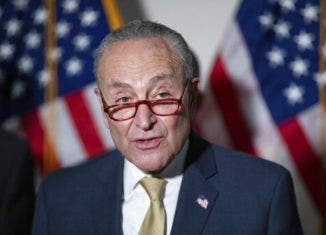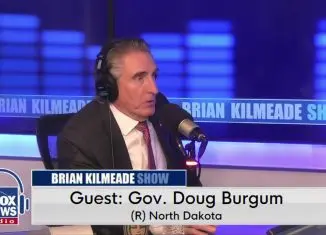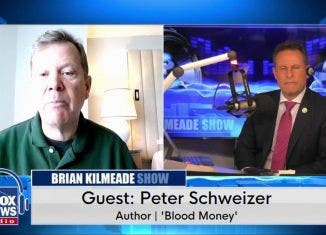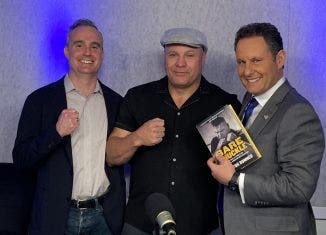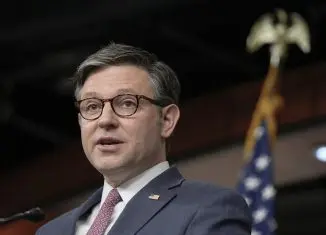Donna Brazile On Her Autopsy Of The Democrat Party After Hillary Clinton’s Defeat
Donna Brazile, former Chair of Democratic National Committee (DNC) joined Brian Kilmeade to discuss her book “Hacks: The Inside Story of the Break-ins and Breakdowns That Put Donald Trump in the White House“.
Brazile explained how the book was designed as an autopsy on why the Democrat party lost the 2016 election, the same way the Republicans looked at the reasons why they lost after the 2012 election. Brazile also went into detail on the DNC becoming part of the Clinton campaign instead of being an independent arbitrator and remaining neutral and working to elect democrats across the country during the 2016 election. When asked about the differences of opinion on campaign tactics with Robby Mook, Brazile said she felt the Clinton camping should have combined the modern analytical approach with the classic ground game approach of meeting and greeting people across the country. Plus, Brazile discussed reaching out to Reince Priebus and Sean Spicer after the DNC email hacking and being unable to get President Obama to think about the DNC and Democrat party’s long term future after he leaves office.
Listen here:
BRIAN KILMEADE, FOX RADIO HOST: Joining us right now is Donna Brazille, author of the best—-selling book –well, the book is fantastic. It’s called –it’s called “Hacks”, and she is now out with the book that I think that a lot of people took the excerpts and said this is a good book, it’s explosive. It’s even better if you actually read it, which by the way, I did. Donna, welcome.
DONNA BRAZILLE, FORMER DNC CHAIR: Thank you so much. Good to talk to you. How was your Thanksgiving?
KILMEADE: Great, Donna. Were you able to relax, kick back, and enjoy it, or were you thinking about your book tour?
BRAZILLE: Well I got off my book tour and I made it back home, and had a chance to go to the grocery store and make some gumbo, so I was really happy to just unwind, and to celebrate the season with so many great friends.
KILMEADE: So I’ve only met you –I’ve interviewed you a couple of times, but you mostly work for CNN. But the thing I like most about you is it doesn’t matter your point of view, you don’t look –you don’t hate people because they disagree with you. That era seems to have gone by the boards. (ph) The hatred flying around is, I tell you, it’s really –it’s numbing.
BRAZILLE: Well you know, I was –I was born at a time when it was very important to forge a compromise, and to really listen to people who might have a different opinion. I’m happy to call –I got so many friends, both you know, media folks, journalists, but also, you know, political leaders.
I used to tell people that when I was back on Capitol Hill as a staffer, whenever Newt Gingrich and Trent Lott the former speaker, the former majority leader in the Senate, and Bill Clinton, the former president, whenever they would sit down, I would –I would go in the room and try to translate, because one was from Mississippi, the other one’s from Georgia, and of course Bill Clinton from Arkansas. I’m from Louisiana. I believe that it –the best thing that we can do as a country is to find ways to —
KILMEADE: Right.
BRAZILLE: — come together. And I still believe it. In fact my –over Thanksgiving, we didn’t talk politics of course, we talked football. I got good news and bad news. The good news is Auburn beat Alabama. The bad news is that the Saints lost to the Rams. So that’s what we do. We sit around, we eat, we drink, we talk –we talk sports —
KILMEADE: Got you.
BRAZILLE: We talk about family. We don’t –we don’t get into arguing over each other over President Trump, anyone else.
KILMEADE: Well what’s there to argue about President Trump? It’s pretty much the same old thing.
BRAZILLE: True.
KILMEADE: Donna, looking at chapter four of the book, it really talks about what you’ve walked into. You went out to save the party using your immense experience and contacts to go back and try to get –to make sure that Hillary Clinton was the next president.
You open up your book saying how you never got the call. When you did get the call, it was a cold call from Hillary Clinton, cold in the way it wasn’t cold, it was cold in the way her demeanor, it wasn’t like thanks for all your help. It was basically almost as if, in my intention, when I picked up the intro was, I kind of blame you guys for not helping me enough.
But the real telling of this book was the numbers in chapter four. When you took over the campaign, Hillary Clinton’s campaign, taking a look at the books, President Obama left the party $24 million in debt, $15 million bank debt, and more than $8 million owed to vendors from 2012.
Hillary for America and their victory fund picked up, took care of 80 percent of that. Now she wanted something in return, and in return she got the loyalty and control of the DNC. Is that correct?
BRAZILLE: Yes, she put –the campaign put the Democratic National Committee on, I call it a starvation diet, by essentially helping to pay down the debt. And of course President Obama went out there every day along with Joe Biden, Michelle Obama and many others to pay down that debt.
But the DNC effectively became part of the Clinton campaign as opposed to the DNC being an independent arbiter of the primary process. That concerned me, and that’s one of the reasons why I think many people read the excerpts and said oh my gosh, she said something. No, I was saying that —
KILMEADE: It’s facts.
BRAZILLE: — as a member of the party. The party should have remained neutral in terms of not having anyone take over those functions. Now I found no evidence whatsoever that in taking over those three departments it played any role whatsoever in the primary.
But still when I –when I became Al Gore’s campaign manager in 1999, I stepped aside as the quote—-unquote co—-chair of the rules and bylaws committee. I stepped aside. So it’s important you step aside and not inject yourself into the primary process.
KILMEADE: You talk about three egos, Debbie Wasserman—-Schultz, President Obama, and President –and Secretary of State Hillary Clinton, all pushing their own direction, not caring enough about the party. In the case of Barack Obama who you obviously like and were thrilled that he got two terms, you feel as though he didn’t come up in the party.
So he didn’t have the loyalty of past people, maybe like Joe Biden would have. So he was actually –and 2014, the President Obama wanted to draw on the party’s $10 million line of credit. Here he is, he’s done, he’s makes some money.
Every time he speaks he makes millions of dollars, but it was all for the Obama superpac. It wasn’t for the DNC. Why were you unable to get through to them that he had to think about the party, not just himself?
BRAZILLE: Well I tried, and I was the last officer who refused to sign the loan papers until I had a guarantee that they would help us pay it back. What worried me was that he took out the –authorized us to take out the loan for the Democratic Congressional Campaign Committee, and the Democratic Senatorial Campaign Committee.
Look, he wanted to win in 2014, but by giving them, you know –you know, that much money in the closing weeks of the campaign, I felt like it wasn’t the best use of our resources when we should have given it directly to the state parties, and the candidates themselves. But you know, those decisions were made. I went along at the end because I didn’t want to do anything to threaten the ability to win that fall.
KILMEADE: So they did not, in my opinion, they didn’t respect you. They didn’t understand that you still had to touch people, meet people, put the lawn signs on, and when the –when the cutting edge –I guess this generation, Robby Mook and Brian Fallon and company, well he was more of a spokesperson, decide to put together a campaign, they’re looking at bar graphs and analytics.
And you’re saying where are the –you’ve got to get on the ground. But yet it’s almost as if you were screaming and people were diminishing you and who you were. And that burns you up, right?
BRAZILLE: Well look, I like politics, I love my country, I have traveled this country, I’ve said in the book I worked on so many campaigns in my adult life that I know the country by zip code, by county. I love the American people.
And when you get out there and the first thing people say to you, Madam Chair, we need some yard signs, we need some posters, we need some activity, well my inclination is to give it to them. Robbie look, I applaud, you know, the modern—-day campaigns, using analytics and many of the things that I didn’t use. I used 3×5 cards, I still have a photographic memory.
But I thought we could have done both. We could have had a ground operation that was responsive to the needs of the people who wanted information, as well as the literature, et cetera, as well as doing the analytics.
But look, I was concerned throughout the entire time about the hacking. The reason why I wrote the book is because the country was under attack.
KILMEADE: Yes.
BRAZILLE: And I felt like that would get lost, and it did get lost even in the release of my book, because nobody’s really dealing with what happened in 2016 in terms of the hacking. What worries me going forward is within the next four months we’re going to start having primary elections for the midterm campaign, and we’re still no better off today than we were back in 2016. That should worry every American.
KILMEADE: Yes, and by the way, Italy is all nervous about their elections, if the Russians are going to play a role, and reaching out to Facebook to calm down –to let them know who’s buying ads and why. That’s how paranoid they are.
Here is a list of some –when you write this book, Donna, and you blast your own party, you tell people what the truth was behind the scenes, without an agenda. I didn’t see you patting yourself on the back here. You’re saying this is what I tried to do, and this is what they told me. So here’s some of what they’re saying about your book, cut 27 (ph), here’s Robby Mook.
(BEGIN AUDIO CLIP)
ROBBY MOOK, 2016 CLINTON CAMPAIGN MANAGER: The idea that the DNC could rig a contest frankly is laughable. The allegation she’s making there simply isn’t true. We don’t –certainly don’t recognize the campaign she describes. We also don’t recall some of the events she said that happened. I’m sure her publisher put her under a lot of pressure. I wish she’d just put her foot down and said I’m not going to do this.
(END AUDIO CLIP)
KILMEADE: Did the publisher put you under pressure?
BRAZILLE: No. I mean you know, look, as I mentioned, I have been active in politics since the age of nine. In two years I will celebrate my 50th anniversary in working on campaigns, 7 presidential, 56 state and local campaigns, 19 campaigns at the state and local level.
Look, if there’s one thing I know in life that’s campaigns. I know all about American politics. Look, I respect them. Robby and all of the others had an opportunity when the campaign was over to write their book, to do a post mortem, to do an autopsy. The Republicans did an autopsy after 2012.
When the campaign manager of your leading candidate decides not to do that, well guess what, the chair, someone who’s been actively involved, saw everything up close and personal, it was my job to write the autopsy.
KILMEADE: Wow.
BRAZILLE: This is my version. He can write his own autopsy. I wish everybody the best, but read my book because I do believe that the American people will come away knowing a little bit more about hacking, what happened, the mistakes, the fumbling, you know, things that I had to deal with in real time. I didn’t try to exaggerate anything other than
KILMEADE: But he says he hasn’t read —-
BRAZILLE: — the fact that I wanted people to know what happened.
KILMEADE: Donna, I don’t mean to cut you off there, because unlike a lot of people you were working with, I do respect what you say. But Robby, he’s basically saying he doesn’t recognize the campaign that you’re describing, and he also –you also just said something I didn’t know. They have no interest in an autopsy, what went wrong? They just seem to want to –it seems to me publicly they just want to blame the Russians.
BRAZILLE: Well that –and look —
KILMEADE: So are you saying they never went back and did even what Reince Priebus did after Mitt Romney lost?
BRAZILLE: I requested that. You know, right after the campaign, I had to stick around. I didn’t leave until the end of February. I went to Phoenix, Detroit, Houston, Baltimore, Atlanta. I wanted to hear from the American people. I made the decision.
I wasn’t the campaign manager, I was the chair of the Democratic National Committee. I didn’t work for Robby Mook. In fact when I was –I didn’t get a salary, so I was a volunteer. I gave up my time, my life, my resources to help elect Hillary Clinton and Democrats up and down the ballot.
So I don’t –I don’t report to Robby Mook or anyone else. I wanted the American people to get a sense of what happened to the Democratic National Committee. We are the –we are the oldest political party in the country. Next year we celebrate our 170th anniversary.
During the entire time I was reaching out to Priebus. You know, every time we learned that the Russians were still trying to hack into our system, I reached out. In the book I talk about reaching out to Sean Spicer, I talked about reaching out to Reince Priebus.
This wasn’t just a Democratic Party attempt to fight the Russians and the hacking, but also —-
KILMEADE: Yes.
BRAZILLE: — it was –I tried to get bipartisan support. Because the only way you’re going to deal with any form of hacking, whether it’s from the Russians, the Chinese, the North Koreans —
KILMEADE: No, I hear you, Donna.
BRAZILLE: — anyone else, you have to be able to reach out and try to win this together.
KILMEADE: Right. Now listen, Donna, the way that call was cold to you in February, that’s one of the reasons why you made sure to write the book, and have you –and Hillary Clinton’s book promotion seems to be a promotion of making excuses and talking about the Russians.
Are you disappointed in Hillary Clinton’s lack of contrition, that Al Gore said OK, I lost? That was a much closer election than this one, so are you disappointed the way she’s acted?
BRAZILLE: You know, she’s busy, she has her own agenda, which I respect. I’ve known her for over three decades. I’ve never been in the inner, inner circle of the Clinton world, or the Clinton campaign, or the Clinton Foundation or anything else.
But I’ve always been supportive. I spent most of my adult career trying to promote, you know, the right to vote, and therefore I’m not into, you know, candidates or campaign worshiping. I respect the right that she can move forward with her life.
I read her book, I thought it was great. She mentioned a lot of things that I mentioned in my book, but more importantly, as the chair of the campaign, I had to describe what impact it had on the party and the country.
KILMEADE: I have about 100 more questions for you, but unfortunately we’re up against the clock. I hope to see you again in studio.
BRAZILLE: We need to call — I need to do it again.
KILMEADE: Yes, let’s do it.
BRAZILLE: I want to do it again.
KILMEADE: All right, so let’s hold on to that number, all right? And we’re not going to give that to anybody, especially the Russians.
BRAZILLE: Well please don’t. They already have it. The Chinese too, I’ve been hacked by both. Well look, I just want to tell all your listeners, God bless you all, may your holiday season, Christmas, Hanukkah, Kwanzaa, whatever it may be, may you celebrate it with joy, and with friendship and laughter. God bless you all.
KILMEADE: It’s called “Hacks”, and that is Donna Brazille. Thanks so much. Back in a moment.

